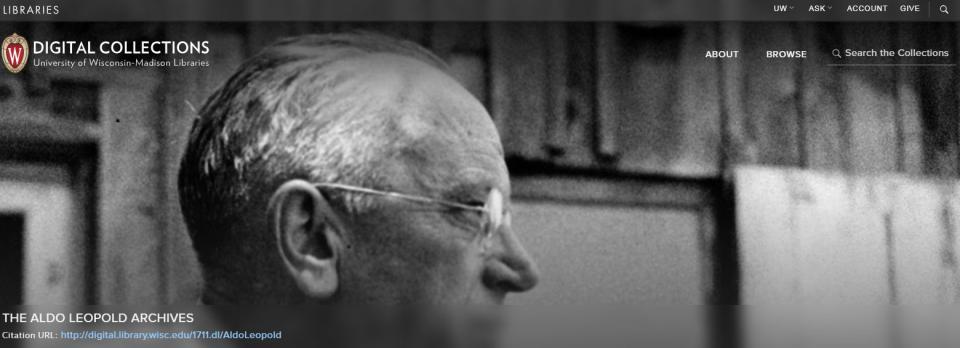The Aldo Leopold Archives. University of Wisconsin-Madison Libraries Digital Collections (website). https://uwdc.library.wisc.edu/collections/aldoleopold/.
Aldo Leopold is considered by many to have been the most influential conservation thinker of the twentieth century. Leopold’s legacy spans the disciplines of forestry, wildlife management, conservation biology, sustainable agriculture, restoration ecology, private land management, environmental history, literature, education, esthetics, and ethics. He is most widely known as the author of A Sand County Almanac, one of the most beloved and respected books about the environment ever published. The Leopold Collection houses the raw materials that document not only Leopold’s rise to prominence but the history of conservation and the emergence of the field of ecology from the early 1900s until his death in 1948.
Leopold was a meticulous and disciplined generator and retainer of important correspondence, memoranda, reports, and related materials. He published more than 500 articles, essays and reports and his papers contain at least 500 more unpublished essays, reports, and memoranda of significance. He also kept detailed diaries and journals of his Forest Service activity, his travels, hunting and field experience, and observations and activities at his Sand County farm. He maintained active correspondence (both outgoing and incoming) with more than a hundred professional and conservation organizations, with his many graduate students, and with hundreds of leaders in a range of scholarly disciplines, professional fields, government agencies, and conservation organizations. His papers reflect the most advanced thinking and most innovative practice across virtually the entire spectrum of natural resource conservation, policy and management in the first half of the twentieth century.
The collection has been augmented by correspondence and related materials carefully retained over the years by his mother, his wife, and other family members and professional associates; these span his entire life, but are most rich and voluminous for his early years. It also includes student notebooks and course materials from his studies in Burlington, Lawrenceville and Yale, and copies of his inspection reports on many national forests in the Southwest as well as hundreds of family photographs and photographs taken by Leopold to illustrate aspects of wildlife ecology and land management.
There exists an archival finding aid to the Aldo Leopold papers, 1887-1948 as part of the Archival Resources in Wisconsin: Descriptive Finding Aids Collection. A finding aid is a description of an archival collection and contains a history of the person or organization that produced the collection and an inventory of its contents. The finding aid to this collection provides detailed information and will facilitate searching the collection online.
The digitization of the Leopold Collection will serve scholars, policy leaders and the general public who look to Aldo Leopold for insight and inspiration on how to deal with complex conservation challenges facing society in the twenty-first century. (Text from The Aldo Leopold Archives)


